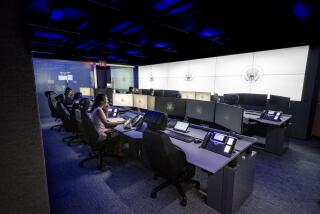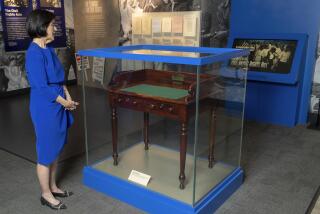Clinton Library Opens With Bridge to the Past and Future
LITTLE ROCK, Ark. — Former President Clinton on Thursday opened the doors of the nation’s 12th presidential library, a $165-million institute that delves into a dynamic era while acknowledging the scandals that nearly brought him down.
The William J. Clinton Presidential Center, a glass-encased, modernist building that plays off Clinton’s metaphor of building a “bridge to the 21st century,” is expected to draw 300,000 visitors a year and provide an important cultural addition to the mid-South.
Inside is a monument to the Clinton presidency but also to the time in which he occupied the White House. Hundreds of photographs and artifacts offer visitors a dizzying timeline of those eight years -- political rancor at home and strife overseas, a bombing in Oklahoma City and fighter jets over Sarajevo, Jon Benet and O.J., Teletubbies and the Hubble Telescope.
During the ceremony, Clinton spoke of vivid changes facing the country when he was elected in 1992. The United States, he said, was emerging from the Cold War, embracing its growing diversity and moving toward an information-based economy. As a result, Clinton said he was drawn to both strains of American politics -- to conservatism when it meant increasing the military’s might or fighting crime, and to progressivism when it meant strengthening public schools or creating jobs.
“When I became president the world was a new and different place,” he said on a dreary, soggy day, with President Bush, Bush’s father and former President Carter behind him on a circular stage. “The whole story is here.”
The audience had a decidedly political bent. Among the 100 members of Congress in attendance was Sen. John F. Kerry, two weeks removed from a losing effort to defeat President Bush. The crowd of nearly 30,000 erupted when Kerry’s arrival was shown on video screens hanging from cranes. Several members of the audience were also seen clutching “Hillary in 2008” bumper stickers -- a reference to some Democrats’ hopes that Clinton’s wife, U.S. Sen. Hillary Rodham Clinton of New York, would run.
On stage, the presidents set aside partisan differences. Clinton said he often joked during the campaign that he was the only person left who liked President Bush and Kerry, and merely felt they had competing visions for the country. Carter said it was “valuable for the world to see two Democrats and two Republicans together, all honoring a great country.”
The Bushes both offered gracious testimony to Clinton.
The first President Bush noted Clinton’s humble beginnings on Harvey Street in Hope, Ark., and said Clinton’s presidency remained an inspirational story. He also called Clinton one of the most gifted politicians in modern history.
“I learned this the hard way,” he said with a laugh, referring to the 1992 presidential campaign, when he lost to Clinton. “He made it look too easy. And, oh, how I hated him for that.”
George W. Bush campaigned in 2000 on a pledge to “restore honor and dignity to the White House,” a reference to Clinton’s affair with former White House intern Monica Lewinsky. But on Thursday he called Clinton “an innovator, a serious student of policy and a man of great compassion.”
Echoing his father’s appreciation of Clinton’s political prowess, he told the story of a voter who was asked to explain his affinity for Clinton. The voter, Bush said, replied that Clinton could “look you in the eye, shake your hand, hold your baby and pet your dog -- all at once.”
After the ceremony, President Bush toured the library and then flew to Crawford, Texas, where he planned to rest before heading to Chile for an economic summit today.
Clinton, still recovering from the heart bypass operation he underwent in September, looked tired during portions of the ceremony. But he appeared energized by some performances, particularly when Bono and the Edge, of the rock band U2, sang an acoustic version of “Sunday Bloody Sunday” in tribute to Clinton’s efforts to secure peace in Northern Ireland.
He was also visibly moved by speeches given by people whose lives were touched by his policies, including a man who used the Family Medical Leave Act to care for his daughter before she died of cancer and a Philadelphia woman who left the welfare rolls to start her own business.
“Those are things that make politics real to me,” Clinton said.
No overview of Clinton’s term would be complete without discussion of the scandals that dogged him, including an investigation into the Clintons’ Whitewater investment and the Lewinsky affair that led to his 1998 impeachment and subsequent acquittal.
One alcove in the library is dedicated to what archivists labeled “The Politics of Persecution.” Lewinsky is mentioned by name and video of the impeachment proceedings runs on a constant loop. But the exhibit is not contrite.
Former House Speaker Newt Gingrich and independent counsel Kenneth W. Starr are depicted as having conducted a witch hunt. One panel describes opinion polls showing that the majority of Americans believed the Republican Party pursued investigations into the Clintons for partisan gain. Another says the impeachment was “not about the Constitution or rule of law, but was instead a quest for power that the president’s opponents could not win at the ballot box.”
Some conservative commentators this week suggested that Clinton was embellishing his record. But former Clinton advisor Bruce Lindsey said the exhibits reflected Clinton’s belief that “this was a systematic Republican Party effort to de-legitimize our administration.”
“It has to be a part of this library,” Lindsey said. “But we tried to do it in a way that is true to history.”
Many of those who attended said they had long been eager to move beyond the scandals and to celebrate what they argued would be his lasting legacy.
“He was for all people,” said Odessa Talley, 77, a Little Rock resident and a retired teacher, who was in the audience. “He has a good heart. He tried to make his presidency represent and reflect America. He stands for what America is supposed to stand for.”
The library, which rests on a manicured, 30-acre campus on the southern bank of the Arkansas River near downtown Little Rock, opens to the public this morning.
*
Times staff reporter Peter Wallsten contributed to this report.
More to Read
The biggest entertainment stories
Get our big stories about Hollywood, film, television, music, arts, culture and more right in your inbox as soon as they publish.
You may occasionally receive promotional content from the Los Angeles Times.











